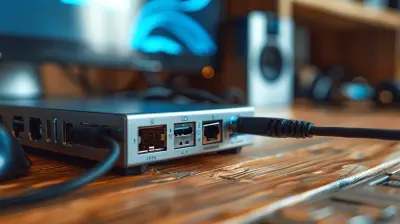How Blockchain is Improving Transparency in Digital Supply Chains
14 May 2025
Supply chains are the backbone of the global economy, facilitating the flow of goods, services, and information across industries. However, many supply chains suffer from inefficiencies, fraud, and a lack of transparency. Enter blockchain—a revolutionary technology that is changing the way supply chains operate by enhancing trust, improving visibility, and reducing risks.
In this article, we’ll dive deep into how blockchain is improving transparency in digital supply chains, its benefits, and the challenges businesses need to overcome to implement it effectively. 
Understanding the Problem: Lack of Transparency in Supply Chains
Before we discuss the solution, let’s first address the core issue—lack of transparency. Traditional supply chains often involve multiple intermediaries, making it difficult to track products from origin to destination. This results in several problems, including:- Fraud and Counterfeiting – Fake products infiltrate markets due to a lack of visibility.
- Data Manipulation – Centralized databases can be altered or tampered with.
- Inefficiencies – Paper-based records and outdated tracking systems slow down operations.
- Unethical Practices – Poor labor conditions or environmental violations often go unnoticed.
These issues not only increase costs but also erode consumer trust. This is where blockchain comes in as a game-changer. 
What is Blockchain and How Does It Work?
Blockchain is a decentralized digital ledger that records transactions across multiple computers. Instead of relying on a central authority, blockchain uses distributed ledger technology (DLT) to store data securely and transparently.Here's how it works:
1. Data Recording – Every transaction or movement of goods is recorded in blocks.
2. Decentralization – Information is not stored in a single location but spread across a network of computers.
3. Immutability – Once data is added, it cannot be altered or deleted.
4. Smart Contracts – Automated agreements execute transactions when conditions are met.
This structure makes blockchain highly secure and nearly impossible to manipulate, making it an ideal solution for enhancing supply chain transparency. 
How Blockchain Enhances Transparency in Digital Supply Chains
Now that we understand blockchain basics, let’s explore how it improves transparency in digital supply chains.1. Real-Time Product Tracking
One of the biggest challenges in supply chains is tracking products in real time. With blockchain, every step of a product’s journey is logged—from raw materials to final delivery.For example, consider a coffee supply chain. Using blockchain, farmers, distributors, and retailers can record every transaction on a shared ledger. A consumer can then scan a QR code on their coffee package to see where the beans were harvested, who processed them, and how they arrived at the store.
This level of transparency builds trust and ensures ethical sourcing.
2. Tamper-Proof Records and Fraud Prevention
In traditional supply chain systems, data can be manipulated, leading to fraud and counterfeit goods. Blockchain’s immutability eliminates this risk. Once an entry is recorded, it cannot be altered, ensuring the integrity of supply chain data.Luxury brands and pharmaceutical companies are already leveraging blockchain to combat counterfeiting. By assigning unique digital identities to products, companies can verify authenticity and prevent fake goods from entering the market.
3. Enhanced Supplier Accountability
Blockchain holds every participant in the supply chain accountable. Since all transactions are recorded and visible to authorized stakeholders, suppliers cannot hide unethical practices, such as using child labor or unsustainable materials.For instance, in the fashion industry, brands can use blockchain to verify that suppliers follow fair labor practices before sourcing materials. Consumers can also access this information, influencing ethical purchasing decisions.
4. Streamlined Documentation and Compliance
Managing supply chain documentation—contracts, invoices, regulatory reports—can be a nightmare. Blockchain simplifies this by storing all documents on a secure, decentralized ledger.Smart contracts automate compliance by executing transactions only when conditions are met. This reduces paperwork, eliminates human errors, and ensures regulatory adherence without delays.
For example, in the food industry, blockchain can track the entire journey of perishable goods. If contamination occurs, companies can quickly trace the source and take corrective actions, preventing large-scale recalls.
5. Faster and More Efficient Payments
Traditional supply chain payments often involve lengthy processing times, intermediaries, and high transaction fees. Blockchain-based cryptocurrency payments speed up transactions while reducing costs.Smart contracts enable automatic payments once conditions are met, eliminating the need for manual approvals. This is particularly beneficial for small businesses and suppliers who face delays in receiving payments from large corporations. 
Industries Benefiting from Blockchain in Supply Chains
Blockchain is already making waves across various industries. Here’s a look at some of the sectors leveraging this technology:1. Food and Agriculture
- Tracks food origin to ensure safety and quality.- Reduces food fraud and contamination risks.
2. Pharmaceuticals
- Prevents counterfeit drugs from entering the market.- Ensures compliance with stringent regulations.
3. Fashion and Retail
- Verifies sustainable and ethical sourcing.- Enhances supply chain visibility for consumers.
4. Automotive Industry
- Tracks vehicle parts to ensure quality and authenticity.- Reduces warranty fraud and recalls.
5. Logistics and Shipping
- Automates freight tracking and reduces paperwork.- Enhances efficiency in cross-border trade.
Challenges of Implementing Blockchain in Supply Chains
While blockchain offers numerous benefits, its adoption comes with challenges:1. High Initial Costs
Implementing blockchain requires investment in technology, infrastructure, and employee training. Many companies hesitate due to these upfront expenses.2. Integration with Legacy Systems
Most businesses operate on traditional supply chain management systems. Integrating blockchain with existing infrastructure can be complex and time-consuming.3. Scalability Issues
Blockchain networks can become slow and expensive as transaction volumes increase. Efforts are underway to improve blockchain scalability through innovations like layer-2 solutions.4. Regulatory Uncertainty
Different countries have different regulations regarding blockchain and cryptocurrencies. Businesses must ensure compliance with evolving legal frameworks.5. Limited Adoption
For blockchain to be fully effective, all supply chain stakeholders need to adopt it. Resistance to change and lack of awareness hinder widespread implementation.The Future of Blockchain in Supply Chains
Despite the challenges, blockchain’s role in digital supply chains is expected to grow. With advancements in technology and increasing adoption, we can expect:- Greater collaboration among industries – More businesses will form blockchain consortiums to improve supply chain transparency.
- Improved blockchain scalability – Innovations will address speed and cost concerns, making blockchain more efficient.
- Regulatory clarity – Governments will define clearer policies, encouraging businesses to adopt blockchain.
- Wider consumer access – Consumers will have greater visibility into product origins, influencing ethical purchasing decisions.
Businesses that embrace blockchain early will gain a competitive edge by building trust, reducing costs, and enhancing operational efficiency.
Final Thoughts
Blockchain isn’t just a buzzword—it’s a technological revolution that’s transforming digital supply chains from opaque and inefficient systems into transparent and trustworthy networks.By enabling real-time tracking, ensuring data integrity, preventing fraud, and automating processes, blockchain is paving the way for a more accountable supply chain ecosystem. While challenges exist, the benefits far outweigh the hurdles, making blockchain the future of supply chain transparency.
Is your business ready to leverage blockchain for a smarter, more transparent supply chain? The time to act is now!
all images in this post were generated using AI tools
Category:
Digital TransformationAuthor:

Reese McQuillan
Discussion
rate this article
5 comments
Simon Mathews
This article succinctly highlights how blockchain enhances transparency in digital supply chains, fostering trust, reducing fraud, and improving efficiency—a crucial evolution for modern logistics. Great insights!
May 22, 2025 at 2:41 AM

Reese McQuillan
Thank you for your feedback! I'm glad you found the insights on blockchain's impact on transparency and efficiency valuable.
Solaria McAndrews
While blockchain enhances transparency in digital supply chains, its effectiveness hinges on widespread adoption and interoperability. Without industry consensus on standards, the promise of transparency may remain unfulfilled.
May 18, 2025 at 2:46 AM

Reese McQuillan
You raise a valid point. Widespread adoption and standardization are crucial for maximizing the benefits of blockchain in enhancing transparency in supply chains. Industry collaboration will be key to realizing its full potential.
Zarenith McMeekin
Exciting insights! I'm curious about specific examples of blockchain enhancing supply chain transparency.
May 17, 2025 at 11:31 AM

Reese McQuillan
Thank you! One example is Walmart using blockchain to track food products from farm to store, allowing for quick identification of sources in case of contamination. Another is De Beers, which tracks the provenance of diamonds to ensure they are conflict-free.
Declan Maddox
In the tapestry of trade, blockchain threads clarity, weaving trust and transparency through tangled paths. Each transaction a whisper, echoing integrity in the digital supply chain’s vibrant dance.
May 15, 2025 at 2:30 AM

Reese McQuillan
Thank you for your poetic reflection! It's a beautiful way to capture how blockchain enhances trust and transparency in supply chains.
Issac McGee
Fascinating insights on blockchain's role in enhancing supply chain transparency! I'm intrigued by how this technology can address trust issues and improve efficiency. Looking forward to seeing more real-world applications unfold!
May 14, 2025 at 11:06 AM

Reese McQuillan
Thank you for your interest! Blockchain's potential to enhance transparency and build trust in supply chains is indeed exciting. Stay tuned for more real-world applications!




